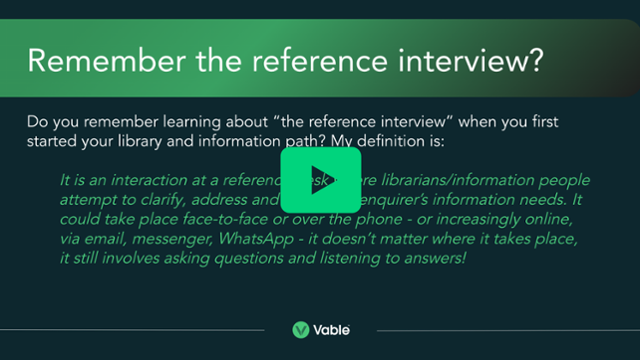Share this
Vable asks: What does the legal information sector think about GenAI?
October 2, 2023

Is there anything new we can say about Generative AI? I’ve been putting off writing about ChatGPT because I’ve been too busy reading about it! But amongst the hype, hallucinations and hope, I was keen to get some answers from those at the centre of the legal GenAI storm. To this end, I conducted an informal survey among legal information professionals.
What is ChatGPT - again!?
As we learned at the 2023 BIALL conference,
ChatGPT is an advanced predictive text autocomplete machine. It determines the most reasonable continuation of a sentence based on patterns it has learned from vast amounts of data. You can find out more about ChatGPT here and how it’s evolving here. It's crucial to note that ChatGPT, like the other AI models, doesn't understand the language it generates. It is both shockingly smart and shockingly stupid!
In less than a year, it has changed the way many of us interrogate, access, summarise and collate information. It is revolutionising people's roles by offering an alternative way of searching for information, drafting content, generating code, and much more, enabling businesses to rethink the way they approach tech.
These innovations have found rapid relevance in the legal sector. Every area of legal business will be impacted, from the business development department to the practical legal heart of the business. The technology embedded in ChatGPT opens avenues for the legal profession to elevate their practices and make them future-ready.
Understand the benefits - without being swept away by the hype
Team Vable is curious about how this emerging (emerged?) technology is impacting legal information professionals. This is why I conducted this small-scale informal survey. Although 14 responses is a relatively small sample - similar to a networking event conversation - I feel it has offered some clarity.
Cautious optimism
The results shed light on the cautious yet optimistic stance of law firms regarding the integration of these tools. The survey revealed a cautious approach by law firms towards Generative AI tools, with 33% of respondents stating their organisations do not officially allow their use.
The comments provided offer a glimpse into the nuanced perspectives within the legal information sector. Some firms are in the phase of controlled testing by a limited number of stakeholders, while others have developed their own proprietary tools.
Practical experimentation
A respondent mentioned, "There are no rules supporting or banning the use of it," highlighting the lack of formal guidelines in some organisations. Another noted, "Our business services teams are currently trialling it but not for legal research or client work," emphasising the restricted and explorative nature of the current usage.
While caution prevails, 60% of respondents have utilized Generative AI tools for tasks such as writing presentations and definitions. One respondent used it "to test its accuracy," while another sought help "when stuck trying to write definitions or need professional (but waffly) language."
These instances underscore the practical applications and benefits of these tools in enhancing efficiency. However, it is crucial to maintain a balanced perspective and not be swept away by the hype surrounding this technology. A discerning approach will enable law firms to harness the true potential of Generative AI while mitigating the risks.
Use your skills to get involved
My small sample suggests that people are interested yet cautious. This broadly reflects the sentiments of Deloitte’s CFO Signals survey for Q3 2023. Although this survey, released recently, gauges the views of financial chiefs on GenAI, it makes for relevant reading.
Almost half (42%) of CFOs say their company is only experimenting with the technology, just 15% say they’re incorporating it into corporate strategy. Meanwhile, 17% said it’s too soon to tell how their organization will use it, but 24% say they’re discussing it.
The cautious - experimental - approach underscores the importance of active involvement by library and information professionals in the testing and implementation process of legal tech tools generally, and GenAI in particular. Your skills and knowledge are pivotal in ensuring the ethical and effective deployment of this technology within law firms.
The Deloitte survey reports that,
More than half of CFOs (59%) note that their organizations’ Chief Technology Officer, Chief Information Officer, Chief Data Officer, or equivalent has ownership of GenAI. A smaller proportion of CFOs indicate that individual functional and business unit leaders and their Chief Strategy Officer or equivalent have ownership over the technology in their organizations. One CFO indicated Chief Privacy Officer as having ownership of GenAI. Another respondent indicated that no one has ownership.
Knowledge, library and information people will be familiar with the firm’s CTOs, CKOs, and CIOs - or equivalent. You might already be collaborating with them on other aspects of legal tech. Who is taking ownership of GenAI in your firm? Who is doing the research and testing? Both surveys serve as a call to action for information professionals to be proactive contributors to the refinement and development of these tools, ensuring their alignment with organisational needs and ethical standards.
Some final words
As law firms navigate an uncertain world economic climate, the right deployment of technology is helping everyone maximise available knowledge swiftly and efficiently. However, the journey towards fully realising the benefits of Generative AI necessitates continuous human input, rigorous testing, and the implementation of the right data protocols.
My reading has uncovered the many issues around ChatGPT. For instance, hallucinations in legal research, copyright infringement and the ownership of training data, and whether we actually know what it can do! There is even the question of the environmental impact of GenAI.
We need intelligent, well-informed opinions. An ethical and successful integration is a collaborative endeavour, requiring the harmonious interplay between human expertise and technological innovation. But to truly assist our firms and be a part of their future, we must take responsibility and learn everything we can about the tech.
Share this
- April 2025 (1)
- March 2025 (1)
- October 2024 (1)
- July 2024 (1)
- June 2024 (2)
- May 2024 (2)
- April 2024 (3)
- March 2024 (3)
- February 2024 (4)
- January 2024 (2)
- December 2023 (1)
- November 2023 (2)
- October 2023 (2)
- September 2023 (1)
- August 2023 (3)
- July 2023 (5)
- June 2023 (2)
- May 2023 (2)
- April 2023 (4)
- March 2023 (1)
- February 2023 (1)
- January 2023 (2)
- November 2022 (2)
- September 2022 (2)
- August 2022 (2)
- July 2022 (1)
- June 2022 (1)
- May 2022 (2)
- April 2022 (3)
- March 2022 (1)
- February 2022 (2)
- December 2021 (2)
- November 2021 (2)
- October 2021 (2)
- September 2021 (2)
- August 2021 (2)
- July 2021 (2)
- June 2021 (2)
- May 2021 (1)
- April 2021 (2)
- March 2021 (1)
- February 2021 (3)
- January 2021 (2)
- November 2020 (3)
- October 2020 (1)
- August 2020 (2)
- July 2020 (4)
- June 2020 (1)
- May 2020 (1)
- April 2020 (2)
- March 2020 (2)
- February 2020 (3)
- January 2020 (1)
- December 2019 (2)
- November 2019 (1)
- October 2019 (1)
- September 2019 (1)
- August 2019 (3)
- July 2019 (3)
- June 2019 (3)
- May 2019 (2)
- April 2019 (1)
- March 2019 (2)
- February 2019 (3)
- January 2019 (3)
- December 2018 (1)
- November 2018 (2)
- October 2018 (2)
- September 2018 (1)
- August 2018 (2)
- July 2018 (1)
- June 2018 (2)
- May 2018 (3)
- April 2018 (3)
- March 2018 (1)
- February 2018 (3)
- January 2018 (1)
- November 2017 (1)
- October 2017 (1)
- July 2017 (1)
- April 2017 (2)
- March 2017 (3)
- February 2017 (1)
- January 2017 (1)
- November 2016 (2)
- October 2016 (1)
- September 2016 (1)
- August 2016 (2)
- June 2016 (1)
- May 2016 (1)
- April 2016 (1)
